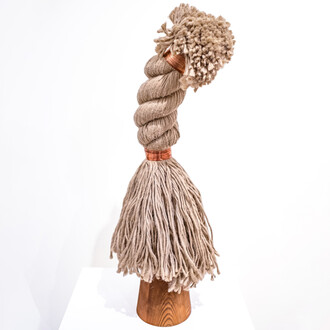As the First World War raged across Europe, a small group of writers, artists and performers came together in neutral Switzerland and started a movement they called Dada (a nonsense word chosen for its universality).
From a small night club in Zurich, the Cabaret Voltaire, developed a radicalised international avant-garde. Zig-zagging across Europe, often feigning insanity to avoid the madness of the First World War, these individuals brought with them ideas and attitudes which forged connections in Zurich, New York, Berlin, Cologne, Hannover and Paris.
Dada was born of a motley group who had gravitated towards Zurich in 1916. This group included Hugo Ball and Emmy Hennings from Berlin, who first established Cabaret Voltaire, and who wrote to Richard Huelsenbeck (a medical student with anarchist sympathies and a literary bent) encouraging him to join them. In its infancy, Dada was a reaction to the horrors of war acted out in the safe space of neutral Switzerland. It came of age in wartime Berlin, with Richard Huelsenbeck’s return from Zurich in 1917, and manifested itself there as a riskier form of resistance. With the end of the war came real revolution and the eventual establishment of the Weimar Republic. Berlin Dadaists including Huelsenbeck, Wieland Herzfelde, John Heartfield, George Grosz and Raoul Hausmann railed against the corruption of the First World War, and later the politicians who had assumed power in its aftermath.
Characterised by the invention of photomontage and otherwise dominated by George Grosz’s raging pen, Berlin Dada was politically motivated.
This display takes Berlin as its main focal point, drawing on the Scottish National Gallery of Modern Art’s holdings of journals such as Neue Jugend, publications for which their editors and contributors risked their freedom. It also places Berlin Dada in its wider national and international context and looks ahead to the rise of National Socialism in Germany, Hitler’s denouncement of what he thought of as ‘degenerate’ art, and the Second World War.
















